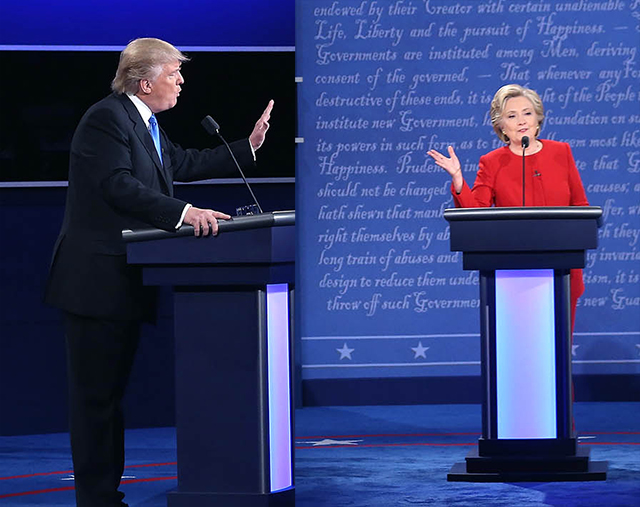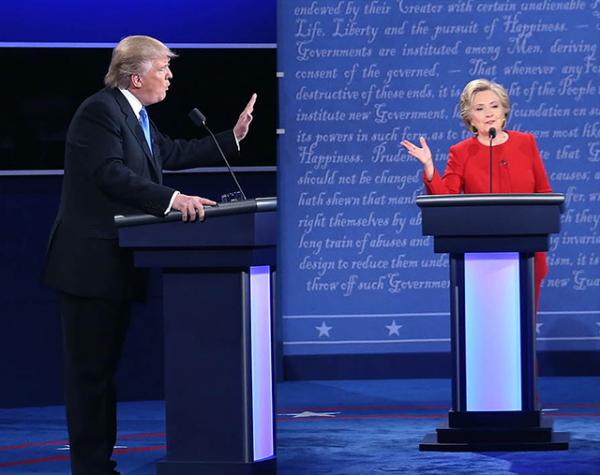KID REPORTERS’ NOTEBOOK
Trump and Clinton Clash Over the Issues


Donald Trump and Hillary Clinton face off during their first presidential debate.
On September 26, Democrat Hillary Clinton and Republican Donald Trump went head-to-head in the first of three presidential debates. The debate took place at Hofstra University in Hempstead, New York. Hundreds of the college’s students attended the debate to hear where each candidate stood on major issues facing the country.
“As a student about to graduate, I want to know that the economy (the system in which goods and services are made and sold in the country) is going to be good,” said Raven Cordice, 20. “I also want to know that minorities in this country are going to be safe and have the same opportunities as everybody else.”
Lester Holt of NBC Nightly News was the moderator of the debate. He asked the candidates questions about issues facing America, including how the candidates would create good jobs for struggling Americans. He also asked them how they would handle national security issues, including threats like terrorism.
Clinton and Trump talked about their very different ideas for solving those problems in the 90-minute debate.
IMPROVING THE ECONOMY
At the start of the debate, Holt asked the candidates how the candidates would create more jobs that would put more money into workers’ pockets.
Clinton talked about her main plan to do that: Increase taxes on the wealthiest Americans. The money collected would be used, she said, to pay for projects like building new roads and fixing bridges, which would create more jobs. She said the government would also use the money to help parents pay for child care and students pay for college.
“The more we can do for the middle class,” Clinton said, “the better off we will be and the better we’ll grow.”
Trump talked about his very different plan to improve the economy. He said he would cut taxes for businesses so they can use the money to create more jobs and not leave the country to set up shop in places with lower taxes. “I’m really calling for major jobs, because the wealthy are going to create tremendous jobs,” he said. “Their companies are going to expand.”
FIGHTING TERRORISM
Another major issue the candidates addressed was national security. They discussed how to prevent more attacks by ISIS, a terrorist group based in the Middle East. They both talked about how they would work with our allies to do that.
“We're working with NATO [the North Atlantic Treaty Organization], the longest military alliance in the history of the world, to really turn our attention to terrorism,” Clinton said. “We're working with our friends in the Middle East.”
Trump expressed concern about NATO, a group of 28 countries that have pledged to defend each other during times of war or attack. “We pay approximately 73 percent of the cost of NATO,” Trump said. “It’s a lot of money to protect other people. I’m all for NATO. But I said that they have to focus on terror.”
WHAT’S NEXT?
A CNN/ORC poll found that 62 percent of viewers thought that Clinton had won the debate. Hofstra student Chris Burke, however, was more impressed with Trump.
“It was a very close race, but I would have to say Donald Trump won,” Chris, 18, said after the debate. “I thought that he was very sophisticated when it came to economic and foreign issues.”
With the November 8 election approaching, the candidates are locked in a close race. They will have two more opportunities to reach all voters directly on television. Debates are slated for October 9 in St. Louis, Missouri, and October 19 in Las Vegas, Nevada. The vice-presidential candidates, meanwhile, will face off on October 4 in Farmville, Virginia.
